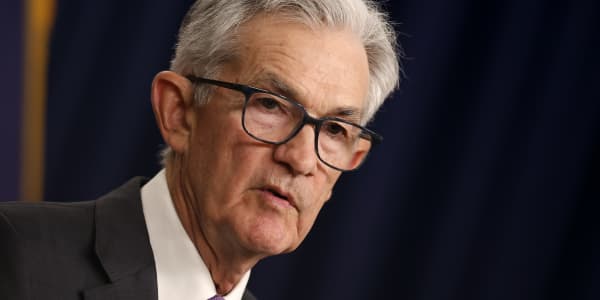This report is from today's CNBC Daily Open, our new, international markets newsletter. CNBC Daily Open brings investors up to speed on everything they need to know, no matter where they are. Like what you see? You can subscribe here.
What you need to know today
U.S. markets on holiday
U.S. markets were closed yesterday for the Fourth of July holiday, while futures were little changed on Tuesday night. European markets broadly fell Tuesday, though the pan-European Stoxx 600 edged up 0.07%. Shares of OMV jumped 7.4% amid speculation that Abu Dhabi's interested in the Austrian oil and gas company.
Inflation exceptionalism
The U.K. is the only G7 country where inflation is still rising, according to data from the Organization for Economic Cooperation and Development. In May, inflation in the G7 fell to 4.6% year on year — but consumer prices in the U.K. rose 0.1 percentage points to 7.9%, compared with April. Some analysts think the country is torn between combating inflation and growing the economy.
China wants a bigger cake
Chinese President Xi Jinping said Beijing opposes "decoupling and breaking links," and wants to make the "cake" — a metaphor for the global economy — bigger, according to a CNBC translation of a Chinese-language state media readout. Xi's remarks came a day after China restricted exports of key metals required for semiconductor manufacturing.
The sky's the limit
Around 30% of the flights operated by U.S. airlines were delayed between June 24 through July 2. But investors aren't fazed. Stocks of major U.S. carriers have risen much more than the S&P 500 this year, driven by sky-high demand for air travel and strong profit forecasts by airlines, thanks to lower oil prices.
[PRO] El Niño is here
El Niño has officially begun, the World Meteorological Organization declared Tuesday. The weather phenomenon will bring higher temperatures to some areas, while increasing the risk of floods in others. Stocks that are directly affected by adverse weather events might get battered — or, contrarily, benefit.
The bottom line
U.S. markets were closed yesterday, so let's look at another that has been booming lately: Japan's. Both the Nikkei 225 and Topix have been continuing to climb after breaching 33-year highs in late May, reinforcing Goldman Sachs' view in May that "Japanese stocks could see a prolonged advance over the medium term." Why are investors and analysts so enthusiastic over Japan?
Two words: Warren Buffett. In April, the Berkshire Hathaway chairman and CEO revealed that he had bought five Japanese trading houses. While Buffett's influence over investor interest in Japan cannot be measured directly, his comments were arguably the catalyst. Japanese indexes began climbing about two weeks after Buffett's remarks, no doubt helped by his description of being "confounded" by the opportunity to buy the companies at "a ridiculous price."
Speaking of ridiculous prices, Japan, like other countries globally, has been grappling with unruly prices. But Japan is trying to get inflation to stick after years of struggling with deflation, to the extent that the Bank of Japan is keeping its short-term interest rate negative. The country's low interest rates and inflation and unexpectedly strong first-quarter economic growth are attracting investors looking for a more welcoming economic environment.
Last, the Tokyo Stock Exchange recently finalized its rules to reform corporate governance. Simply put, the exchange wants executives to ensure share prices reflect the value of their companies more accurately. That might mean share buybacks or a focus on profitability to push up prices — all music to investors' ears.
To be sure, investors are still wary that the latest rally in Japan might prove to be a bubble like the one that burst in the 1990s. Some of that fear might be spreading. After 12 consecutive weeks of channeling money into Japanese shares, foreign investors turned into net sellers last week, according to data from Japan's Finance Ministry.
But analysts think there are still peaks that Japanese stocks can ascend to. "I'm sure there are a lot of long-term investors who are considering carefully about increasing equity allocations," said Masayuki Kichikawa, chief macro strategist at Sumitomo Mitsui DS Asset Management. Buffett, perhaps the epitome of a long-term investor, is perhaps one of them — Berkshire recently increased its stake in its Japanese investments. That's a strong vote of confidence.
The land of the rising sun may yet see a new dawn in its stock markets.





